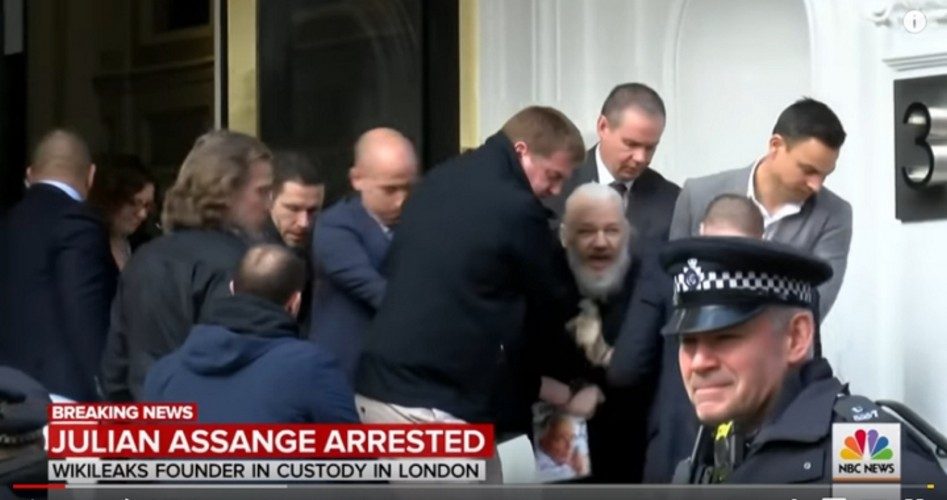
WikiLeaks founder Julian Assange (shown, with white beard) was arrested today, after the Ecuadorian embassy in London terminated his asylum and allowed police to enter the embassy and forcibly remove him. His arrest marks a turning point in the nearly decade-long legal battle between Assange and the U.S. Department of Justice stemming from WikiLeaks’ publication of hundreds of thousands of classified U.S. government documents beginning in 2010.
Assange sought asylum in the Ecuadorian embassy in in London in 2012 while facing charges in Sweden of sexual assault against two women. At the time, Assange claimed those charges were a ploy to take him into custody so that he could be extradited to the United States to face charges of espionage. Those charges have since been dropped, but Assange remained holed up in the embassy from August 2012 until today, when Ecuador terminated his asylum and turned him over to London police.
Assange’s claims that the charges against him were trumped up to allow his extradition to the United States seem to have some credibility. It was widely reported in mid-November 2018 that a mistake in a run-of-the-mill court filing revealed that U.S. prosecutors in the Eastern District of Virginia had secretly charged Assange in connection with WikiLeaks’ damning publication of classified documents and videos, including the Collateral Murder video (April 2010) showing the July 2007 Apache helicopter attacks that killed two Reuters staffers among other innocent victims, the Afghanistan War Logs (July 2010), the Iraq War Logs (October 2010), and CableGate (November 2010), which included thousands of classified diplomatic cables that embarrassed then-Secretary of State Hillary Clinton and others.
Those leaks — which not only made WikiLeaks a household name, but also brought on the ire of the U.S. government owing to the explosive revelations they brought to light — were provided by Private First Class Bradley Manning who, in 2009, was assigned to an Army unit in Iraq and worked as an intelligence analyst. Manning exfiltrated the documents and videos by inserting a blank CD labeled as music into his work station and copying the files.
While WikiLeaks takes great measures to protect its sources, including protocols to mask their identity even from WikiLeaks itself and encryption standards which have never been broken, Manning unmasked himself by giving too much information to a journalist in a gay chat room. He was arrested in July 2010 and charged under the Espionage Act. He could have faced the death penalty, but was instead sentenced to 35 years imprisonment in Leavenworth. His sentence was commuted by President Obama in the waning hours of his presidency.
After the arrest and conviction of Manning, the U.S. government intensified its investigation of Assange and WikiLeaks. The WikiLeaks publication of the Clinton, Podesta, and DNC e-mails during the 2016 election cycle was used to further escalate the intensity of those investigations, with accusations that WikiLeaks was acting on behalf of the Russian government — despite the fact that there has never been any credible evidence that the Russian government had any involvement with either WikiLeaks or the disclosure of the Clinton, Podesta, and DNC e-mails.
After Assange was arrested, Ecuadorian President Lenín Moreno — of whom Assange has been critical — released a statement saying that his government takes seriously international law regarding asylum, but had “reached its limit on the behavior of Mr Assange.” Moreno said he had “asked Great Britain for the guarantee that Mr Assange will not be extradited to any country in which he could suffer torture or face the death penalty” and that the “British government has confirmed it in writing.”
Moreno’s assurance of the U.K.’s assurance is not — after all — very reassuring. Bloomberg is reporting that in an indictment unsealed mere hours after his arrest, the United States accused Assange of assisting Manning in “hacking a password stored on United States Department of Defense computers.” The United States appears to be seeking extradition and — if successful in that attempt — will likely charge Assange with a litany of crimes under the Espionage Act. A conviction for those charges could bring a sentence of death.
Across both the U.K. and the United States, many are celebrating Assange’s arrest. British Prime Minister Theresa May told a cheering parliament, “The whole House will welcome the news this morning that the Metropolitan Police have arrested Julian Assange, arrested for breach of bail after nearly seven years in the Ecuadorean embassy” and on this side of the pond, GOP lawmakers are joining the celebration.
Representative Lindsey Graham (R-S.C.) tweeted, “I’m glad to see the wheels of justice are finally turning when it comes to Julian Assange,” adding, “In my book, he has NEVER been a hero.” Graham’s gleeful tweet went on to say, “His actions — releasing classified information — put our troops at risk and jeopardized the lives of those who helped us in Iraq and Afghanistan.”
And Senator Cory Gardner (R-Colo.) tweeted, “I commend British police for the arrest of Julian Assange after nearly 7 yrs in self-imposed exile inside the Ecuadorian Embassy. I call for the immediate extradition of Assange to the US where he’ll answer for aiding & abetting a foreign power to undermine US democracy & laws.”
With their hyperbole duly noted, the reality is that Assange did not “put our troops at risk and jeopardized the lives of those who helped us in Iraq and Afghanistan” or rise to the level of “aiding & abetting a foreign power to undermine US democracy & laws.” What Assange did was to reveal to the world the secret actions of the Military Industrial Complex in the United States.
Perhaps the insight of another man who risked both his liberty and his life to reveal the wrongdoings of the State is worth hearing. Edward Snowden — who has been in exile in Russia since his narrow escape in the wake of his own leaks in 2013 — tweeted, “Assange’s critics may cheer, but this is a dark moment for press freedom.” His tweet described the arrest of Assange as “Ecuador’s ambassador inviting the UK’s secret police into the embassy to drag a publisher of — like it or not — award-winning journalism out of the building” and said that pictures of the arrest “are going to end up in the history books.”
And while President Moreno certainly applauds Assange’s arrest while giving lip service to the principle of asylum, his predecessor Rafael Correa, who granted Assange the asylum Moreno terminated, expressed his frustration by tweeting that Moreno is “the greatest traitor in Ecuador and Latin American history” for having “allowed the British police to enter our embassy in London to arrest Assange.” His tweet also said, “Moreno is a corrupt man, but what he has done is a crime that humanity will never forget.”
And President Trump, who had high praise for Assange and WikiLeaks during the campaign and when the Clinton, Podesta, and DNC e-mails were published, seems to have forgotten those former times now that the United States is seeking to extradite Assange and charge him with espionage. When asked about the arrest at the White House today, President Trump answered, “I know nothing about WikiLeaks. It’s not my thing.”
Assange may be in for a grueling few months or years, as the legal battle to extradite him could take that long. Under British law, even if the United States and the U.K. agree on the terms of extradition, Assange can fight it all the way to the U.K. Supreme Court.
Image: screenshot from YouTube video




